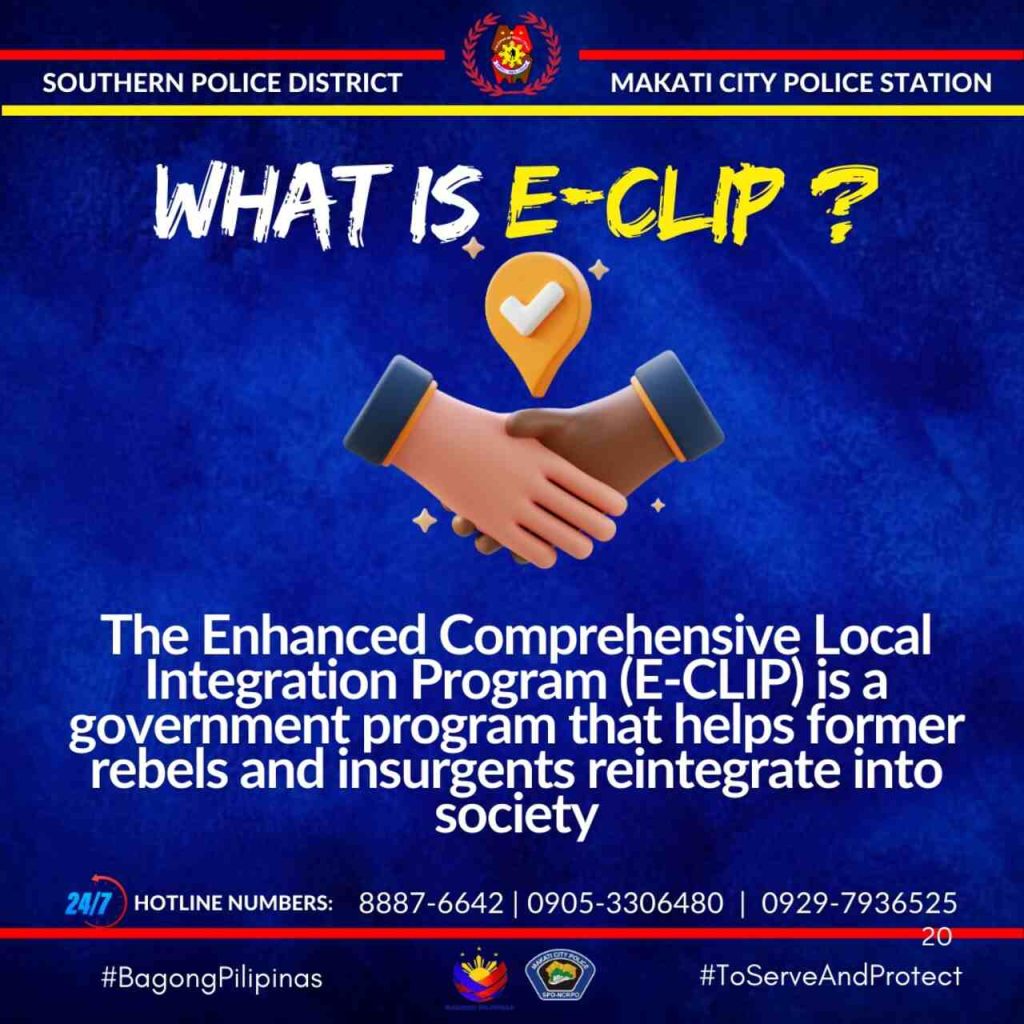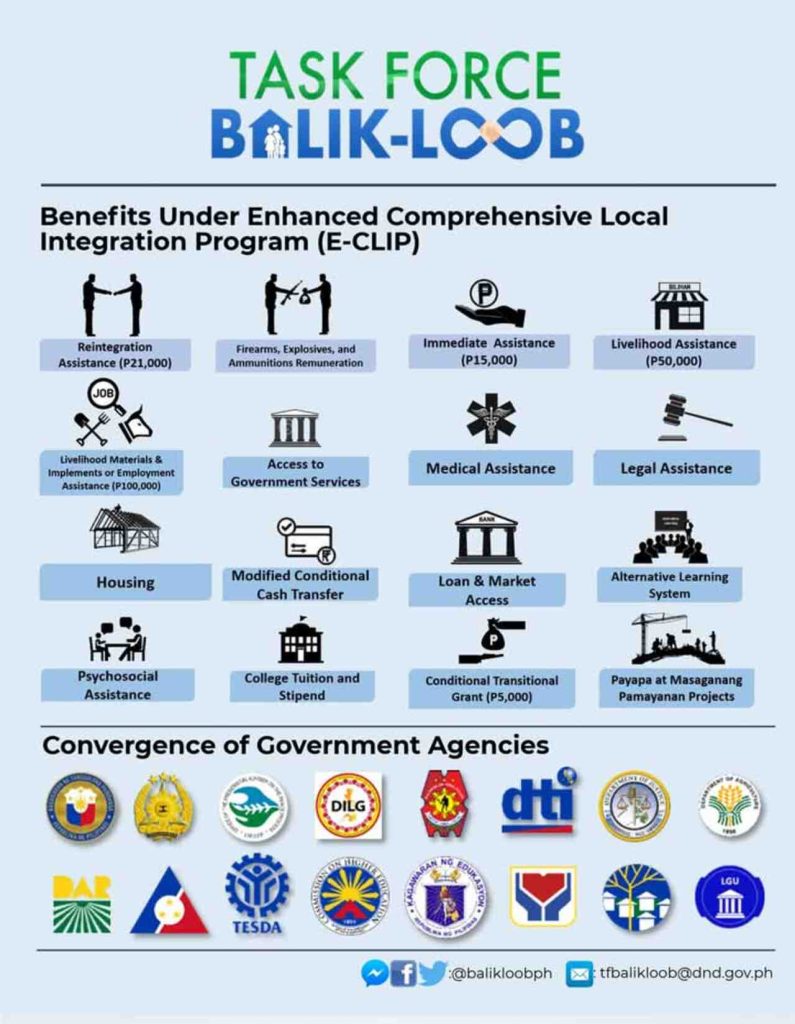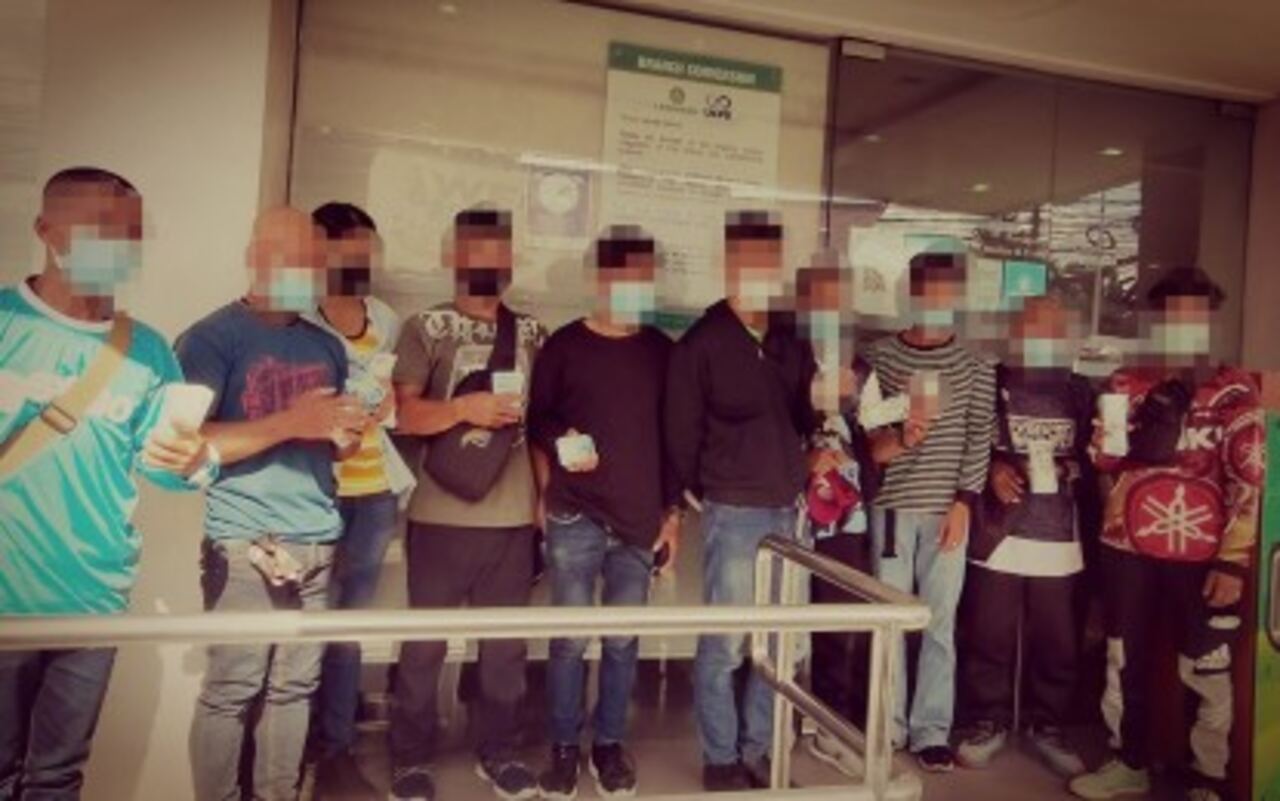The Enhanced Comprehensive Local Integration Program (E-CLIP) is a government program designed to help former rebels (FRs) and former violent extremists (FVEs) reintegrate into society through financial, livelihood, educational, and psychosocial support. It was established as part of the government’s broader peace and security efforts to encourage individuals from insurgent and extremist groups, such as the Communist Party of the Philippines-New People’s Army-National Democratic Front (CPP-NPA-NDF) and Abu Sayyaf Group, to abandon armed struggle and become productive citizens. The program is implemented by the Task Force Balik-Loob in collaboration with local government units (LGUs), the Armed Forces of the Philippines (AFP), the Philippine National Police (PNP), and other key agencies.
Understanding what E-CLIP is all about is important because of its goal to foster long-term peace and development in conflict-affected areas through the resolution of the root causes of insurgency and violent extremism. Its ultimate goal is to create a sustainable and peaceful society where former rebels and violent extremists can rebuild their lives alongside their families and communities. With this program in place, eligible individuals who voluntarily surrender can access benefits such as financial aid, housing, livelihood training, and legal assistance to ensure their smooth reintegration into mainstream society along with their beneficiaries, their families, and their communities.
Features and Benefits of E-CLIP

E-CLIP provides a comprehensive package of assistance to help former rebels (FRs), former violent extremists (FVEs), their families, and communities reintegrate into society and lead productive lives. Some of these benefits include:

For Beneficiaries (FRs and FVEs)
- Financial Assistance: Immediate cash assistance, livelihood support, and firearms remuneration.
- Livelihood and Employment Programs: Skills training, entrepreneurship support, and job placement assistance.
- Education and Training: Access to formal and non-formal education, scholarships, and technical-vocational training.
- Housing and Relocation Assistance: Provision of temporary or permanent shelter for eligible beneficiaries.
- Health and Psychosocial Support: Medical services, mental health counseling, and social reintegration programs.
- Legal Assistance: Support in legal processes, including clearance and reintegration into the community.
For Other Stakeholders (LGUs, AFP, PNP, and Civil Society)
- Capacity Building for Implementers: Training, seminars, and workshops to enhance program delivery and reintegration efforts.
- Community Development Support: Infrastructure projects and social services to strengthen communities affected by insurgency.
- Peace and Security Improvements: Strengthening local peace initiatives and reducing conflict in affected areas.
Who Are Eligible?
The program is specifically designed to help the following target beneficiaries:
- Former members of the CPP, NPA, NDF, and Militia ng Bayan (MB) who voluntarily abandoned the armed struggle.
- Former members of violent extremist groups such as the Abu Sayyaf Group, Maute Group, Dawlah Islamiya, Bangsamoro Islamic Freedom Fighters (BIFF), Turaife Group, and other identified groups who have chosen to renounce violence and rejoin society.
- The immediate families of former rebels and violent extremists, including spouses, children, or parents.
- Institutions, communities, and LGUs involved in peace and reintegration efforts.
Qualifications
To qualify for this program, applicants must at least meet the following criteria:
For Individual Beneficiaries
- Must be a Former Rebel (FR) who was a member of the CPP, NPA, NDF, or MB and has voluntarily surrendered.
- Must be a Former Violent Extremist (FVE) who was a member of identified extremist groups such as the Abu Sayyaf Group, Maute Group, Dawlah Islamiya, Bangsamoro Islamic Freedom Fighters, Turaife Group, or other violent extremist organizations recognized by Task Force Balik-Loob.
- Must have surfaced or voluntarily returned to the fold of the law and expressed intent to reintegrate into mainstream society.
- Must have undergone identity verification by the JAPIC.
- Immediate family members (spouse, children, or parents) of an eligible FR or FVE may also qualify for certain assistance.
For Community Beneficiaries
- Must be an LGU, particularly a provincial government or a HUC government, involved in peace and reintegration efforts.
- Civil Society Organizations (CSOs) and other stakeholders engaged in the reintegration process may also receive support for program implementation.
Required Documents
To apply for assistance under this program, interested applicants must also submit the following:
For Individual Beneficiaries (FRs/FVEs)
- Duly Accomplished E-CLIP Enrollment Form
- Certification from the Joint AFP-PNP Intelligence Committee (JAPIC) verifying the applicant’s identity as an FR or FVE
- Endorsement Letter from the LGU or concerned government agency
- Form 7
- Form 8
- Form 9
- Form 10
- Form 11
- Personal Data Sheet (PDS) or Bio-Profile of the applicant
- Copy of Birth Certificate (or any government-issued ID for identity verification)
- Certificate of Surrender issued by the AFP/PNP unit that facilitated the surrender
- Affidavit of Undertaking stating the applicant’s commitment to reintegrate into mainstream society
- Checklist
For Immediate Family Members Applying for Assistance
- Proof of Relationship (e.g., birth certificate, marriage certificate, or other relevant documents)
- Endorsement from the E-CLIP Committee or Local Social Welfare and Development Office (LSWDO)
For Community Beneficiaries (LGUs and CSOs)
- Project Proposal outlining reintegration efforts for FRs and FVEs
- Memorandum of Agreement (MOA) with relevant government agencies and stakeholders
- Financial Plan or Budget Proposal detailing the use of E-CLIP assistance funds
- Endorsement from the Provincial/HUC E-CLIP Committee
Additional Requirements for Livelihood Assistance (LA)
- FRRP or FVERP; and
- Business Plan (Mungkahing Proyekto)
Additional Requirements for Firearms Remuneration (FA)
- Property Turn-In Slip (PTIS)
- Technical Inspection Report (TIR)
- Cost Valuation Certificate
- Photo documentation (photograph of the FR or FVE with his/her FEA and separate photograph of the FEA)
- Justification, if applicable
Liquidation of Funds Disbursed
- Status of Fund Transferred (Form 11)
- Photo documentation showing the FR or FVE receiving the Check (for IA, LA, & FA)
- Photo documentation showing the FR or FVE with his/her firearms and a separate photograph of the firearms with visible serial number (for FA)
- Official Receipt and other related documents (for IA)
Steps to Avail Assistance Under E-CLIP
If you or someone you know is eligible, here’s a step-by-step guide on how to avail of the program’s benefits.
Step 1: Determine Eligibility
The E-CLIP is open to former members of communist terrorist groups (CTGs) and their immediate family members who have voluntarily surrendered to the government. Former rebels (FRs) must pledge allegiance to the government and undergo a validation process to qualify.
Step 2: Coordinate with Local Authorities
Interested applicants should approach the nearest government office involved in the E-CLIP implementation. These include:
- The LGU
- The Department of the Interior and Local Government (DILG)
- The AFP or PNP
Step 3: Submit Required Documents
Applicants will need to prepare and submit certain documents, which may include:
- A written statement of voluntary surrender
- A personal profile or background information
- Certification from the JAPIC confirming eligibility
- Other relevant identification or supporting documents
Step 4: Verification and Processing
After submission, the authorities will verify the applicant’s background and validate their eligibility. This may involve interviews, assessments, and cross-checking records to ensure that the applicant qualifies for the program. Once verified, the E-CLIP Committee, co-chaired by the Provincial Governor or HUC, Mayor, and the AFP Brigade Commander, will oversee the processing of assistance with the help of representatives from the LSWDO, Department of the Interior and Local Government (DILG), PNP, CSOs, and peace and development councils to ensure efficient delivery of services
Step 5: Receive Assistance
Once approved, beneficiaries can receive various forms of assistance, such as:
- Immediate Cash Assistance: An initial amount for basic needs upon surrender
- Livelihood Assistance: Training and financial support for small businesses
- Housing Assistance: Temporary or permanent shelter options
- Education and Skills Training: Access to TESDA vocational courses
- Reintegration Support: Counseling and community integration programs
- Legal Assistance: Support in legal matters, such as pending cases
- Health and Psychological Support: Access to medical care, psychological counseling, and community reintegration programs.
- Security and Protection: Safety measures to protect the surrenderer and their family from potential threats.
Step 6: Participate in Reintegration Activities
Beneficiaries are encouraged to actively engage in livelihood training, skills enhancement, and community development programs provided by the government to ensure a smooth transition back into society.
Step 7: Continuous Monitoring and Support
Government agencies and LGUs will provide follow-up support to help former rebels sustain their livelihood and reintegration efforts. Regular check-ins and monitoring ensure that assistance is effectively utilized.
Where to Secure the Application Form or Apply for Assistance
Applicants can secure the E-CLIP Enrollment Form and apply for assistance through the following offices:
- LGUs: Provincial and Highly Urbanized City (HUC) government offices, particularly the Local Social Welfare and Development Office (LSWDO)
- DILG Provincial/HUC Office: Provides guidance on E-CLIP application and program implementation
- AFP or PNP Units: Specifically the unit that facilitated the surrender of the applicant
- E-CLIP Committee: The designated local committee responsible for processing applications and ensuring proper documentation
- Task Force Balik-Loob (TFBL): The national body overseeing the reintegration program, which provides additional support and verification
- Online or Official Government Portals: Some government agencies may provide downloadable application forms on their official websites or social media pages
Applicants are advised to visit their nearest LGU, DILG, AFP, or PNP office to get the latest information and assistance in completing the E-CLIP application process.
Capacity Building for Implementers
The E-CLIP Task Force, in collaboration with member agencies, conducts training, seminars, and other capacity-building activities for implementers. This ensures that the program is effectively managed and executed at the local level, allowing a smooth transition for former rebels and extremists into their new roles in society.
Video: Understanding E-CLIP
The E-CLIP is a necessary step towards the promotion of peace and development in the country. Through a well-structured support system, it empowers former rebels and violent extremists an opportunity to rebuild their lives and contribute positively to society. Through this, the government also offers various forms of assistance, including financial aid, livelihood programs, housing, and legal support, ensuring that they stay on-board with the government’s peace-building efforts. Learn more about E-CLIP by watching this video from the Provincial Government of South Cotabato:
Now, if you or someone you know is eligible for this program, then you may reach out to the nearest local government unit or the DILG, AFP or PNP office for any concerns or inquiries or if you wish to begin the process of reintegration and assistance
